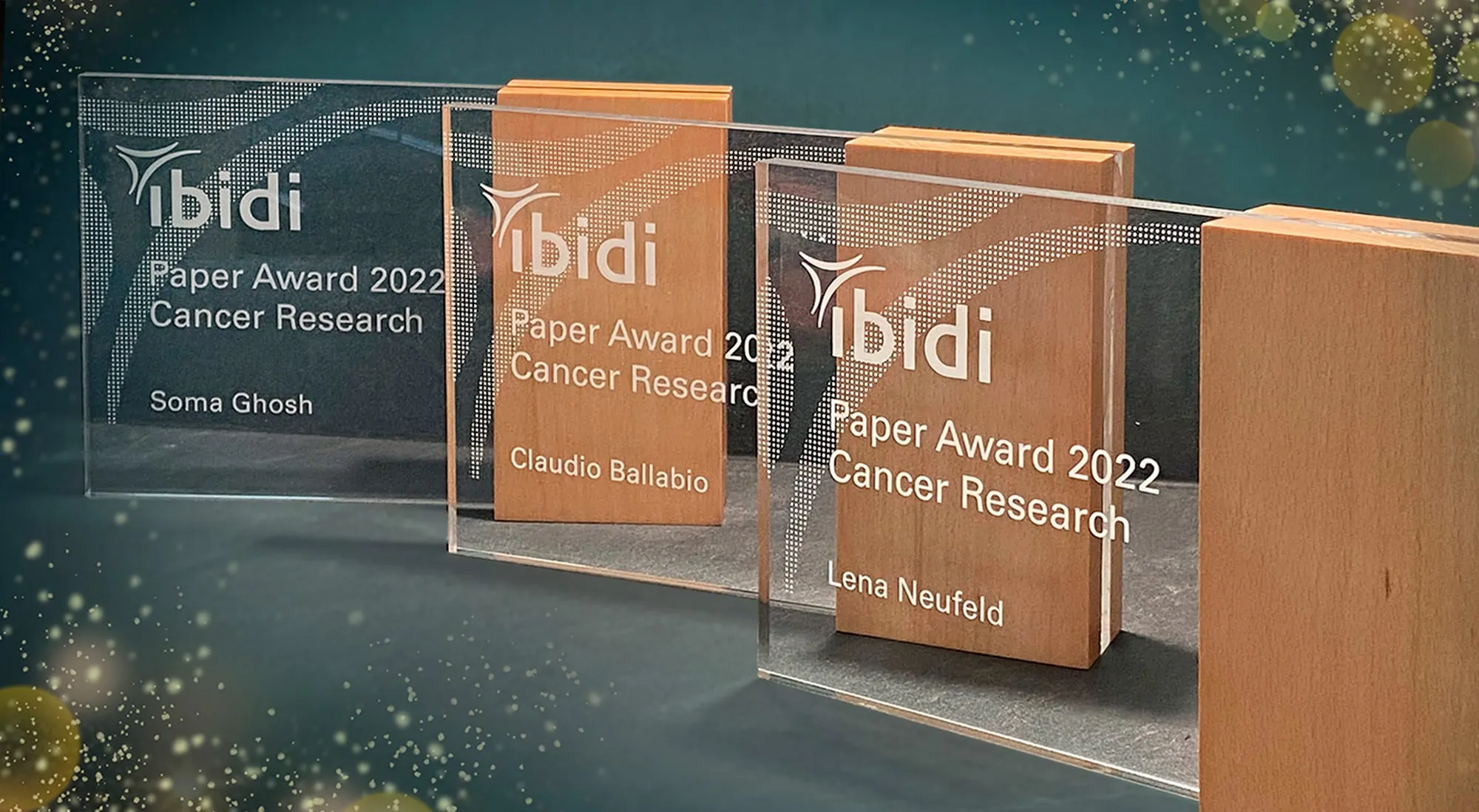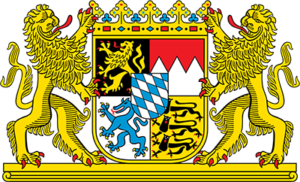First-time ibidi Paper Award recognizes accomplishments of three early career scientists
The scientists were awarded for their outstanding first-author publications in the field of cancer research, using innovative ibidi solutions in their work.
July 2022

© ibidi GmbH
The ibidi Paper Award 2022
“We are very impressed with the number of outstanding publications submitted by our young customers. It is great to see that our products and assays are widely used in the important field of cancer research. Congratulations to the winners and all the participants!”
Roman Zantl,
Co-founder and managing director of ibidi
ibidi GmbH is an IZB Alumni and a leading supplier of functional cell-based assays and products for cell microscopy. The company recognized this year the accomplishments of one PhD student and two postdoc students for successfully publishing their findings in reputable scientific journals with the first ibidi Paper Award. An expert jury, comprised of three renowned international cancer researchers, selected winners from applicants all over the world and rewarded them each with €500.
The ibidi Paper Award has been created to annually recognize the first or last author publications, in a specific field, of early career scientists who have used innovative ibidi solutions in their work.
For this first year, the focus of the award was cancer research, a discipline that is dedicated to investigating and developing treatments for a disease that still threatens the lives of millions worldwide. The scientific discoveries that have come from this year’s ibidi Paper Award winners have led to important findings that were published in high-impact journals to advance the knowledge in this field.
“We are very impressed with the number of outstanding publications submitted by our young customers. It is great to see that our products and assays are widely used in the important field of cancer research. Congratulations to the winners and all the participants!” says Roman Zantl, co-founder and managing director of ibidi.
The jury chose Lena Neufeld, M.Sc., a PhD student from Tel Aviv University in Israel, to receive the ibidi Paper Award 2022 for her first author publication in Science Advances with the title, “Microengineered perfusable 3D-bioprinted glioblastoma model for in vivo mimicry of tumor microenvironment.” The study recapitulated the tumor heterogenic microenvironment by creating fibrin glioblastoma bioink consisting of patient-derived glioblastoma cells, astrocytes, and microglia.
In addition, perfusable blood vessels were created using a sacrificial bioink coated with brain pericytes and endothelial cells. Neufeld, along with her co-authors, could show that the response to pharmacological agents in these 3D-bioink platforms at the transcriptional level was very similar compared to orthotopic cancer mouse models, as opposed to 2D cultures on rigid plastic plates. This publication stood out to the jury because of its novelty, complexity, and validation using murine and human cells, and because of the transcriptional analysis performed thereafter.
The next awardee is Claudio Ballabio, PhD from The Francis Crick Institute in London, UK, who was recognized for his first author publication, “Notch1 switches progenitor competence in inducing medulloblastoma” in Science Advances. Together with his colleagues, Claudio investigated the role of the Notch 1 pathway in the initiation of Group 3 medulloblastoma (MB), a malignant childhood brain cancer with a poor prognosis.
They have established an elaborated mouse model together with single-cell transcriptome analyses and studies on organoids. In addition, this study is of significant relevance, because it is directly related to tumor diseases in children.
Soma Ghosh, PhD from The MD Anderson Cancer Center in Houston, Texas, USA is the final recipient of the ibidi Paper Award 2022. She was recognized for her findings in EGFR signaling, which were published in Cell Reports under the title, “PD-L1 recruits phospholipase C and enhances tumorigenicity of lung tumors harboring mutant forms of EGFR.” Ghosh and her colleagues described how high EGF signaling stabilizes PD-L1 RNA and enhances tumorigenesis and invasiveness.
They also proposed a novel molecular mechanism based on phospholipase C-g1 (PLCg1) recruitment to PD-L1 that enables EGF receptor phosphorylation and activation of PLCg1 that, in turn, through the stimulation of calcium flux, Rho GTPases, and protein kinase C, promotes an aggressive phenotype. In summary, Ghosh and her colleagues demonstrated a novel role of PD-L1 as an essential factor in EGFR signaling to help understand how this immunotherapeutic target works.
ibidi is a leading supplier of functional cell-based assays and products for cell microscopy located at IZB
The ibidi range of products offers solutions for classic cell culturing, and also complex assays (e.g., angiogenesis, chemotaxis, and wound healing). Their products help facilitate an understanding of the development of various diseases and related therapies. ibidi’s customers are working in scientific institutions, industrial pharmacology, and biotechnology. Technology development at ibidi is supported by the BMBF (Bundesministerium für Bildung und Forschung). The products are sold to customers worldwide.



